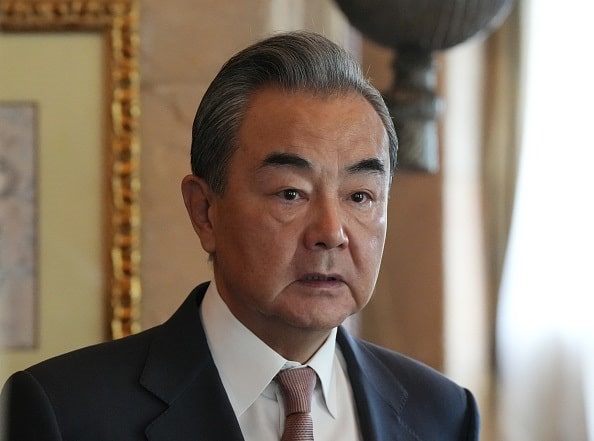China reaches out to the United States on Thursday, Oct. 26, with a visit from Beijing’s foreign policy chief Wang Yi. After several high-level US diplomatic missions to the People’s Republic of China (PRC) achieved no real thaw in the relationship between the two countries, this outreach comes at a critical time in world affairs. There are increased tensions in the Indo-Pacific, and Chinese coast guard vessels are colliding with resupply ships from the Philippines.
The aggressive behavior of the PRC coast guard and the People’s Liberation Army Navy (PLAN) in international waters adjacent to the Philippines makes Wang’s discussions in Washington timely. Substantive conversations are set with Secretary of State Antony Blinken and National Security Advisor Jake Sullivan. And surely US officials will be gauging China’s intentions in the Middle East conflict.
China Supports Hamas Terrorists, Make No Mistake
“[W]e see that Iran, principal sponsor of terrorism, [is] sending drones to the Russians and attacking – Hezbollah and, in this particular situation, Hamas – attacking the Israelis with drones. So it’s all connected. We know which side they’re on. We need to view this as a worldwide problem,” Senate Minority Leader Mitch McConnell (R-KY) told Shannon Bream on Fox News Sunday.
President Joe Biden’s foreign policy team will be well served to focus on the Indo-Pacific and the PLAN’s mischief in the region. “U.S.-China relations have deteriorated rapidly since 2018 over issues such as trade imbalance, human rights in the northwestern region of Xinjiang, the militarization of the South China Sea,” correspondent Didi Tang wrote for Associated Press. Four days before the planned meeting with US officials, a Chinese Coast Guard cutter purposely collided with Philippine ships in a persistent naval campaign of harassment. A Voice of America editorial explained:
“On October 22, a Philippine supply ship and a Coast Guard vessel that accompanied it, were rammed by two Chinese vessels as they made their way to resupply a small military garrison on Second Thomas Shoal, a part of the Spratly Archipelago. This incident took place only 10 weeks after a Chinese Coast Guard ship used a water cannon against another Philippine supply vessel to prevent it from completing a similar mission.”
 If the Chinese Communist Party (CCP) continues to make the Indo-Pacific a battleground, the United States must return to the Philippines and other allied and friendly nations. Biden’s national security team’s initial reaction to the ramming incident was encouraging. In a phone call between Sullivan and his Filipino counterpart, Eduardo M. Año, the US representative reaffirmed America’s strong support for the Philippines and its rights to freedom of passage within its exclusive economic zone. In a readout of the call released by the White House, “Mr. Sullivan emphasized the ironclad US alliance commitments to the Philippines under the U.S.-Philippines Mutual Defense Treaty, which extends to armed attacks on Philippine public vessels, aircraft, and armed forces — to include those of its Coast Guard — in the Pacific, including in the South China Sea.”
If the Chinese Communist Party (CCP) continues to make the Indo-Pacific a battleground, the United States must return to the Philippines and other allied and friendly nations. Biden’s national security team’s initial reaction to the ramming incident was encouraging. In a phone call between Sullivan and his Filipino counterpart, Eduardo M. Año, the US representative reaffirmed America’s strong support for the Philippines and its rights to freedom of passage within its exclusive economic zone. In a readout of the call released by the White House, “Mr. Sullivan emphasized the ironclad US alliance commitments to the Philippines under the U.S.-Philippines Mutual Defense Treaty, which extends to armed attacks on Philippine public vessels, aircraft, and armed forces — to include those of its Coast Guard — in the Pacific, including in the South China Sea.”
US Stands With the Philippines

Wang Yi (Photo by Soeren Stache/picture alliance via Getty Images)
Wang should get an unvarnished assessment of where China stands with the United States. The PRC is viewed as a threat economically and militarily, and it is a mistake to view China as an honest broker with world peace as its agenda. Consequently, the United States has embarked on an enhanced military exercise program in the Indo-Pacific to prepare for CCP aggression beyond hostile acts such as purposefully colliding with boats engaged in peaceful maritime activities.
The US military intends to strengthen its capability with the Philippines. In early spring, the United States and the Philippines conducted their largest ever combined exercise. “The significance of the exercise should not be underestimated. The recent Enhanced Defense Cooperation Agreement between the governments of the United States and the Philippines allows US forces on a rotational basis access to and use of nine military camps and bases,” Liberty Nation reported.
Wang will no doubt use his visit to Washington as an opportunity to push the CCP worldview, which so far has not included constructive détente between America and China. So, US officials would do well to admonish Wang for supporting Iran and make clear continued aggression in the South China Sea will prompt a US response and bolster the Philippines with American forces.




